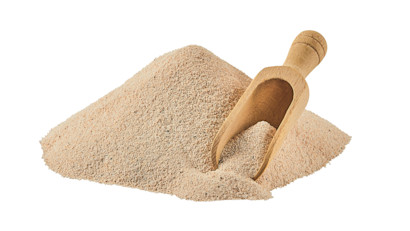Why Magnesium Matters in the Equine Diet
Updated January 9, 2025

Magnesium is an essential mineral for maintaining your horse’s health, impacting everything from muscle function to metabolic balance. Evaluating your horse’s diet, with the help of a veterinarian or equine nutritionist, is key to ensuring their magnesium and other nutrient needs are being met.
If there is a possibility your horse is deficient in magnesium, then a supplement might be advantageous. Selecting the right magnesium supplement involves understanding its role, the different forms available, and how to choose one that meets your horse’s specific needs.
What Does Magnesium Do for Horses?
Magnesium is involved in many key bodily functions, including:
- Muscle Health: Promotes muscle contraction and relaxation and aids in preventing cramps and stiffness.
- Nerve Signaling: Helps nerve cells communicate properly.
- Metabolic Function: Regulates insulin and glucose metabolism.
- Bone Strength: Enhances calcium absorption and may improve bone health. About 60% of a horse’s magnesium is in their bones, while another 30% is in skeletal muscle tissue.
- Enzyme Reactions: Activates many enzymes in the body and helps maintain proper water-electrolyte and blood acid-base balances.
Magnesium Deficiency in Horses
Magnesium is classified as a macro-mineral because horses require it in relatively large amounts compared to trace minerals (like copper and zinc). It is an essential nutrient for horses and is most often supplied in adequate quantities in the diet, as it is found in both forage and grains.
The National Research Council’s (NRC) Nutrient Requirements of Horses recommends a 1,100 lb adult horse in no work receive a serving size of 7.5 grams of magnesium (7,500 milligrams) daily. Horses that are in heavy work, are young and growing, or are pregnant or lactating could require double that amount of magnesium (15 grams per day) or more but should not exceed the NRC recommended maximum tolerable level of 0.8% of the diet (roughly 80 grams).
Signs of Magnesium Deficiency in Horses
In horses fed a well-balanced diet, true magnesium deficiency may be fairly uncommon. However, signs of magnesium deficiency may include:
- Nervous or anxious behavior
- Muscle tremors or twitches
- Headshaking
- Ataxia (lack of muscle coordination or gait abnormalities)
- Increased risk of insulin resistance
The most common causes of magnesium deficiency are poor quality hay, stress, and excessive sweating during exercise.
Benefits and Uses of Magnesium Supplements

Studies have shown that oral magnesium supplementation can be given to generally healthy horses with minimal to no side effects and can raise both serum and intracellular levels of the mineral [1]. There are several uses for magnesium supplementation in horses, including:
- Metabolic Support: Magnesium is a necessary nutrient that supports proper insulin function by improving glucose metabolism. As a part of a multimodal approach, magnesium supplements may be recommended for horses with metabolic disorders. The role of magnesium as well as the efficacy in alleviating insulin resistance is currently being studied.
- Calming and Behavior: Horses that are not receiving enough magnesium may exhibit this deficiency through changes in their behavior, such as being excitable or nervous. Restoring your horse to their ideal magnesium level will support nervous system and muscular health. This, in turn, may promote relaxation and a calm demeanor. Magnesium is a commonly used ingredient in non-herbal, nutrient-based calming supplements for horses.
- Gastric Health: Horses suffering from Equine Gastric Ulcer Syndrome (EGUS) have been shown to have lower levels of magnesium [2], which suggests levels of the mineral may play a role in the issue. Additionally, magnesium carbonate may help support stomach health by acting as a buffering agent, neutralizing stomach acid.
- Digestive Obstructions: Some forms of magnesium, such as magnesium sulfate, may be given via a nasogastric tube as a laxative to pass intestinal contents in the case of impactions.
- Support Mares During Heat Cycle: Some supplements for mares include magnesium for its effects on muscles by helping to ease tightness and cramping that may occur during the estrous cycle.
It is always recommended that you talk with your veterinarian about which magnesium supplement may be appropriate for your horse’s individual needs and how long it should be fed.
Video on Magnesium for Horses
In this Ask the Vet video, Dr. Lydia Gray answers a horse owner question on the reasons for giving a horse a magnesium supplement and its potential benefits.
Evidence-Based References
- Stöckle, S. D., Müller, E., Winter, J. C., Sponder, G., Aschenbach, J. R., Pieper, L., & Gehlen, H. (2019). Dose-dependent effects of magnesium supplementation on serum and intracellular magnesium concentrations in healthy horses. Pferdeheilkunde Equine Medicine, 35(6), 529–536. https://doi.org/10.21836/pem20190605
- Muñoz-Prieto, A., Cerón, J., Tecles, F., Cuervo, M., Contreras-Aguilar, M., Ayala, I., Oudada-Guillén, A., Pardo-Marín, L., & Hansen, S. (2024). Measurement of trace elements (Zinc, copper, magnesium, and iron) in the saliva of horses: validation data and changes in equine gastric Ulcer Syndrome (EGUS). Animals, 14(12), 1724. https://doi.org/10.3390/ani14121724